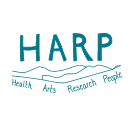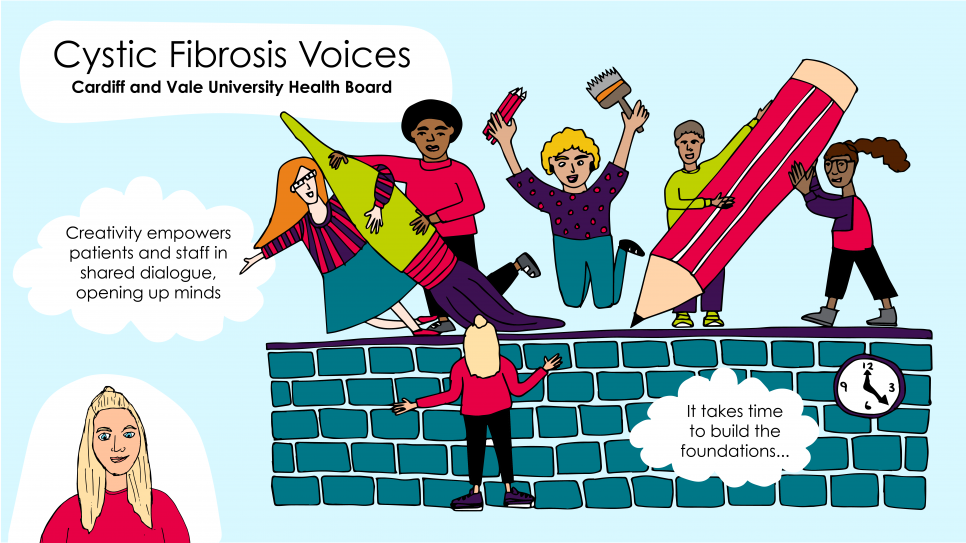HARP Nourish was about collaborating to help - or ‘nourish’ - great arts and health innovations to learn more about their impact and how they might become embedded in health places.
Responding to the needs arising from the pandemic, and recognising that innovation was taking place throughout the sector, we aimed to learn more about how the arts could help health and care systems with their biggest challenges during Covid-19 and how impactful arts innovations within health and care settings can grow and survive longer term
What was involved in the HARP Nourish programme?
Between March 2021 and March 2022, we worked alongside a cohort of 10 partnerships between health and arts organisations, as they delivered and developed arts and health innovations, identifying their own goals and challenges which they shared with the network of partnerships and worked together to make progress on. Ultimately, the project was about learning - not just on an individual project basis but across the whole cohort.
What were we hoping to learn about?
As a learning programme, we were working with the Nourish teams to establish how it might be possible to achieve:
More sustainable funding models for arts and health projects
Robust evidence of the impact of the arts on people and health / care systems
A shared understanding of the value of the arts between health and arts partners
A range of inclusive, high-quality arts projects for health
Clear pathways for people to access the arts
Each partnership worked independently on their own goals and impact, supported by a HARP Coach and the Y Lab Research Fellow. The whole cohort also came together across the year to share learning, skills and knowledge in webinars facilitated by the Wales Arts, Health and Wellbeing Network in partnership with Y Lab and the Nesta People Powered Results team. These sessions were guided by the partnerships based on the challenges and assets the cohort identified themselves.
The focus was on collaborative learning (as well as more technical training where required) - so we created spaces - whole cohort webinars and more focused topic learning groups - where projects could learn from each other and contribute to a better collective understanding of both delivery and impact of arts and health projects. Together, we looked to the future, identifying what it will take for ideas to survive and grow, and what needs to happen to make this possible.
Research
Since this programme was also a research project, we worked with all projects to observe and measure the outcomes and impact of the programme, both on participants and organisations.
Funding
Grants of up to around £35,000 were made to each of the 10 partnerships, made possible by the Arts Council of Wales, through their Lottery funds for arts and health.
What were we hoping to achieve through HARP Nourish?
Ultimately, new and better solutions to the health and care system’s current challenges. Whether the teams wanted to conduct more relevant or impactful evaluations, support more people, engage health system leaders or a combination of these (or indeed something else), the HARP Nourish programme was designed to help them meet these goals as well as delivering real benefit to their people.
We know that collaborative innovation is crucial in helping the very best ideas to grow and survive, so the safe and supportive space of the programme allowed the projects to approach their development by drawing on a wide network of skills and knowledge to get the very best outcomes.
Who did we work with?
To be eligible for participation in HARP Nourish the projects met the following criteria:
The project was based in Wales, delivering to people who live in Wales
The idea was well-formed and has ideally already been tested with participants
There was a strong team, with named health, arts and evaluation partners
The project sought to meet a clear local need in one of the following HARP priority areas in Wales, either:
supporting the health and care workforce;
building the resilience of people with mental or physical health challenges; and/or
improving the health of marginalised, underrepresented or at-risk groups of people
The team was ambitious around impact and has a commitment to learning
All partners were committed to long term sustainability and have some early ideas of how this might be possible
There was demonstrable leadership support from within the health and care sector
The health place supplied 10% match funding to the project (cash or in-kind)
10% of total budget was ring fenced for evaluation/research
We know that these projects reached many hundreds of vulnerable participants and made a huge difference to people’s lives.
What happened?
We know that these projects reached many hundreds of vulnerable participants and made a huge difference to people’s lives. As of May 2022, the full impacts of the HARP Nourish projects are still to become clear, with many projects continuing beyond the end of HARP, securing additional funding and expanding their partnerships.
As a team, we saw the value of offering non-financial support and taking a learning approach. Many have told us that they have got immense value from the space, support and new networks that HARP offered. Indeed, our collaborative approach to learning has, through the convening of our HARP ‘learning group’ workshops, underpinned the development of the HARP Approach and Recommendations.
HARP Nourish delivery team:
Rosie Dow, programme manager, Nesta
Angela Rogers, coordinator, Wales Arts, Health and Wellbeing Network
Jessica Clark, programme coordinator, Nesta
Sofia Vougioukalou, research fellow, Y Lab (Cardiff University

